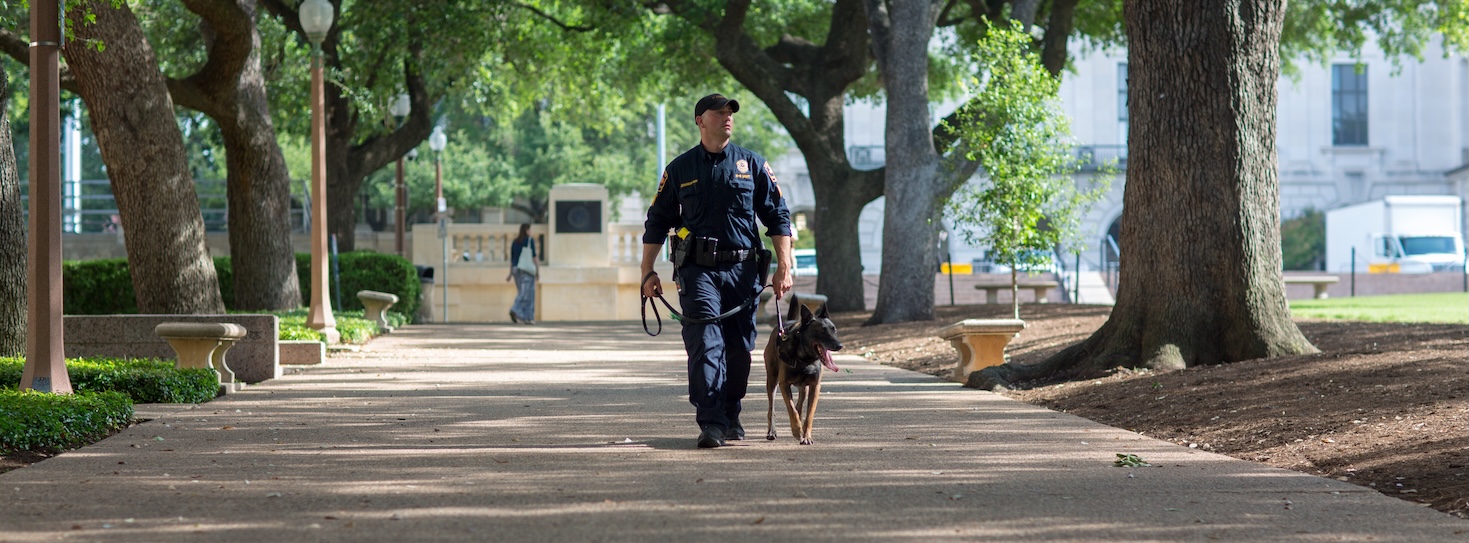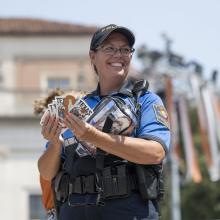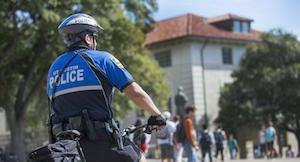

From the day your children arrived in your life, your number one responsibility has been to keep them safe. Now that your student is independently navigating living and learning in a campus community, located in a large metropolitan city, personal safety has become their responsibility.
Under the direction of President Davis, campus leadership continues to make safety a top priority as they strive to make the University of Texas at Austin the best possible place for learning, living and working. The student body leadership has worked hand in hand with the University administration to create a culture of safety awareness that helps students understand the crucial role they play in their own safety, as well as that of others.
Students are encouraged to follow three key behaviors ensure their personal safety:
- Don’t walk alone, especially at night. If walking with friends is not achievable, the University offers two safe walk or travel options: SURE Walk and UT Night Rides.
- Be aware of your surroundings.
- Call 911 anytime you feel unsafe. UTPD also offers a free safety app called LiveSafe at UT Austin allowing users to instantly text 911 dispatch and submit photos and videos if calling is not an option.
These messages make students aware of the resources available to help them, and creates a foundation of safe practices to build upon. Our hope is that all Longhorns utilize these outside-the-classroom lessons of personal safety beyond their years on the Forty Acres.
With a unified message from parents/families and the UT community, the message of personal safety responsibility will resonate with students. We encourage you to talk to your student about personal safety and point them to the many safety resources on campus.
We urge you to become familiar with the resources on the University’s Campus Life, Safety & Security Resources page as well as those that you find below.
Emergency Communications
In the event of an emergency situation or campus closure, UT Austin has a variety of tools to communicate with the public. Emergency information is posted on the UT Austin home page as well as the University’s emergency website. The University of Texas Police Department (UTPD) also communicates emergency and safety information via their Facebook and X pages.
UT Austin students are automatically signed up for Longhorn Alert notifications at the beginning of every school year. Parents, family members and others can sign up to receive Longhorn Alerts by texting “UTGUEST” or “UTPARENT” to 888-777 (please note this number is for text messages only).
To better understand emergency management at the University and how your student can contribute to these efforts, visit the University's Emergency Management webpage, and this FAQ page.
Emergency Contact Numbers
Social Media Accounts
Healthyhorns Facebook
Healthyhorns represents the Longhorn Wellness Center, Counseling and Mental Health Center, and University Health Services at UT Austin.
Healthyhorns Twitter
Healthyhorns represents the Longhorn Wellness Center, Counseling and Mental Health Center, and University Health Services at UT Austin.
Safety & Security Resources
Campus Carry
Learn more information about Campus Carry at UT Austin.
Campus Watch
Campus Watch is a free email that presents selected information about recent crimes reported to or observed by UTPD in the campus area and does not represent an official crime log or compliance with any federal or state statute. Subscription required.
Crime Statistics and Clery Reports
Online and on demand statistical and analytical information about crime reported in the state. Includes a PDF link to UT’s Annual Security and Fire Safety Report.
Crime Prevention Tips
Tips to help your student prevent crime.
Global Risk and Safety
Located in Texas Global, Global Risk and Safety monitors worldwide travel conditions, provides emergency support and offers resources on official university travel, including study abroad.
Incident Notifications
UTPD releases timely warnings about reported crimes to the campus community in a manner that will aid in the prevention of similar crimes, as well as providing emergency notifications when the health and safety of the campus community is at risk.
Personal Safety Tips
Encourage your student to follow these personal safety tips.
Property Engraving
To protect valuables, UTPD recommends your student marks their property with their state-issued driver’s license number.
Safety, Health and Security Resources
A collection of UT Austin campus safety, health and security resources with contact information for each department.
Safety Hubs and Celebrated Entrances
In addition to after-hours access, the celebrated entrance of academic buildings is also designed to provide emergency and lifesaving resources to faculty, staff, and students.
Theft Prevention
Theft is the most common crime on college campuses. UTPD encourages your student to prevent crime by taking preventative actions.
University of Texas Police Department (UTPD)
UTPD is a fully-functioning, accredited state police agency with more than 100 sworn officers serving the UT community 24 hours a day.
Off-Campus Safety
APD District Representatives
Similar to the UTPD district representative program, APD has officers assigned to specific areas in Austin. Each officer is dedicated to serving their assigned community, so reach out to your representative for non-emergency issues.
Meet Your Officers (District Map)
UTPD launched a program that assigns an officer to a particular area, including some areas off campus. Using the district map, you can identify and contact your district officer representative for non-emergencies.
Off-Campus Living Resources
A website that provides resources, programming and community for UT students living off campus.
SURE Walk
Students can request volunteer companionship on their late night walk home.
UT Night Rides
Students can request free Lyft rides home from campus late at night.
Safety Apps
Austin 311
With the Austin 3-1-1 smart phone app, students can work with city departments to make Austin the most livable city in the country. The smart phone app is equipped with several features helping students report concerns within the City of Austin.
LiveSafe at UT Austin
A free mobile app giving the UT community immediate access to police dispatch via the communication tool most frequently used—text.
Health & Well-being
24-Hour CMHC Crisis Line
CMHC Crisis Line is a confidential service that offers an opportunity for UT-Austin students to talk with trained counselors about urgent concerns.
Behavior Concerns Advice Line (BCAL)
A 24/7 advice line, providing students an opportunity to discuss their concerns about another individual's behavior. Trained staff members will assist callers in exploring available options and strategies, along with providing appropriate guidance and resource referrals.
Mental Health Promotion and Suicide Prevention Program
This comprehensive initiative of the Longhorn Wellness Center is designed to foster a culture of support and minimize harm around mental health and well-being.
Thrive at UT App
Thrive at UT is a free app designed to enhance UT student well-being and help students navigate through challenging times.
TimelyCare
TimelyCare is a virtual mental health and well-being platform for currently enrolled UT Austin students and provides support in over 240 languages.
UHS 24-Hour Nurse Advice Line
The UHS Nurse Advice Line is staffed 24 hours a day, every day of the year. Call for advice on how to care for an illness or injury at home or guidance about whether and when to see a healthcare provider.

Safety Resources
In Case of Emergency or Campus Closure
Information is posted on the UT Austin Emergency Information website. We recommend bookmarking the page for your convenience.
Contact Texas Parents
Hours: Mon-Fri, 8 a.m.-5 p.m. (CT)
Location:
Student Services Building (SSB) 4.104
Address:
100 W Dean Keeton Street
Mail Stop A4300
Austin, Texas 78712
Phone:
512-471-2353
Website:
http://www.TexasParents.org